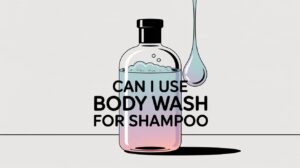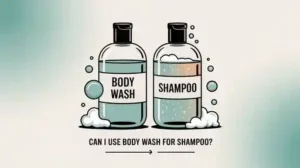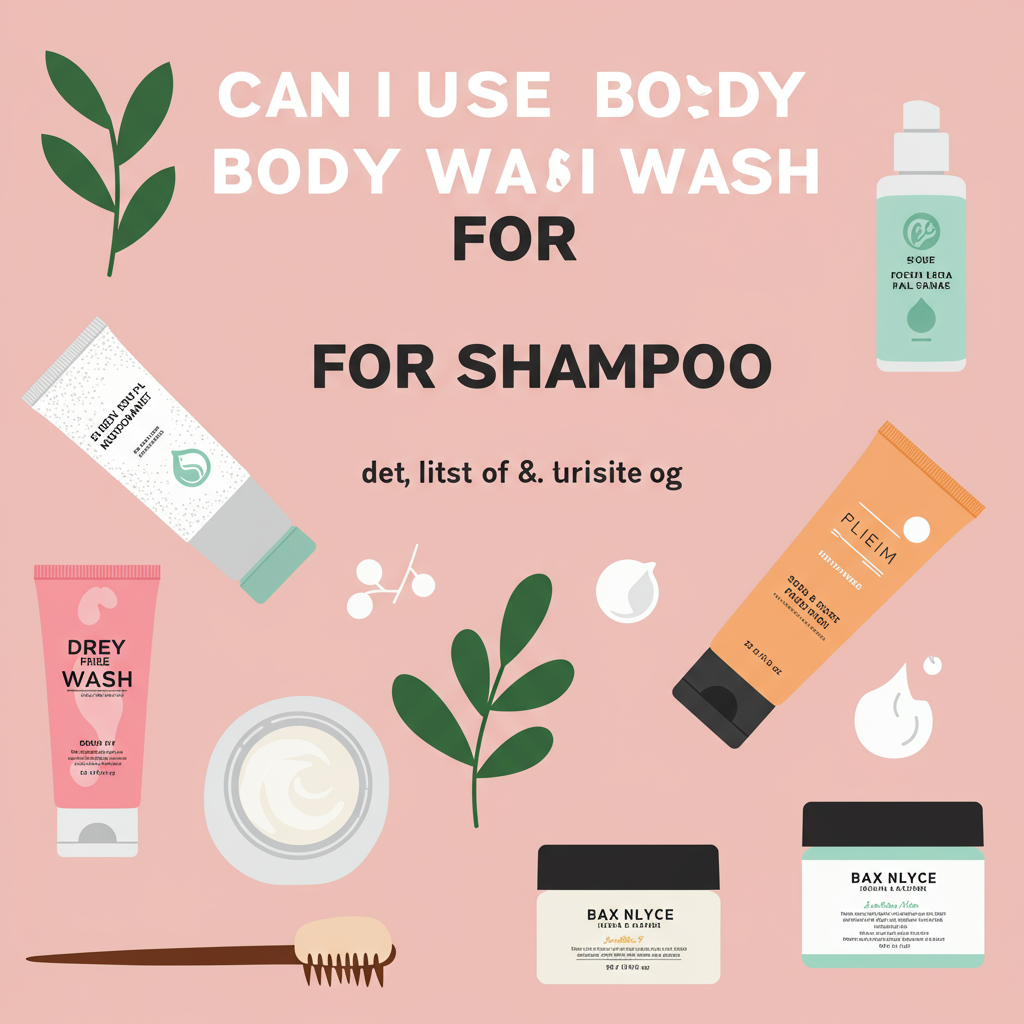We’ve all been there: standing in the shower, reaching for the shampoo, only to find the bottle empty. Your eyes scan the shelf, landing on the vibrant, often sweet-smelling bottle of body wash. A question pops into your head: “Can I use body wash for shampoo?” It seems like a quick fix, a simple swap to get clean and out the door. But is it really a good idea for your hair?

This common shower dilemma sparks curiosity and, sometimes, leads to desperate measures. While using body wash as shampoo might seem harmless in a pinch, understanding the underlying differences between these two products is crucial for maintaining the health and vitality of your hair and scalp. In this comprehensive guide, we’ll dive deep into the science behind shampoos and body washes, explore the pros and cons of using body wash for hair, and provide practical advice for those emergency situations. By the end, you’ll have a clear answer and the knowledge to make informed decisions about your hair care routine.
The Quick Answer: Can You Use Body Wash as Shampoo?
The short answer is: yes, you can use body wash as shampoo in an emergency, but it’s generally not recommended for regular use. While both products are designed to cleanse, their formulations are optimized for different purposes and different parts of your body. Your hair and scalp have unique needs that body wash simply isn’t equipped to meet on an ongoing basis.
Understanding the Basics: What’s the Difference?
To truly grasp why using body wash for hair isn’t ideal, it helps to understand how shampoos and body washes differ:
- Shampoo: Specifically formulated to clean hair and scalp. It’s designed to remove oil, dirt, and product buildup from the hair shaft without stripping too much of the natural oils (sebum) that protect your scalp and hair. Shampoos often contain conditioning agents, proteins, and ingredients that address specific hair concerns like dryness, oiliness, or color protection.
- Body Wash: Created to cleanse the skin on your body. Body washes are typically formulated to remove dirt, sweat, and surface oils from the skin, often with a focus on moisturization to prevent skin dryness. They tend to have stronger cleansing agents and can be more heavily fragranced.
The pH Factor: Hair vs. Skin
One of the most significant differences lies in their pH levels. Healthy human skin typically has a pH of around 4.5 to 5.5, which is slightly acidic. Hair and scalp also thrive in a slightly acidic environment. Shampoos are generally formulated to match this pH, helping to keep the hair cuticles sealed and smooth, reducing frizz, and maintaining scalp health. Many body washes, however, can have a higher, more alkaline pH, which can:
- Cause the hair cuticles to lift, leading to rougher, duller hair.
- Strip natural oils more aggressively, resulting in dryness and frizz.
- Potentially irritate a sensitive scalp.
When It’s Okay (and When It’s Not): Practical Scenarios
Knowing when it’s appropriate to make the swap can save you from a bad hair day or worse.
Emergency Situations: A One-Time Fix
If you’re in a bind – perhaps traveling and forgot your shampoo, or you’ve run out at home – using body wash as shampoo once or twice likely won’t cause lasting damage. Think of it as a temporary solution to get your hair clean. The pros in this scenario are clear:
- Convenience: It’s readily available and gets the job done when no other option exists.
- Cleanliness: It will remove dirt and oil, preventing you from going out with greasy hair.
Just remember that this should be an exception, not the rule. Your hair will thank you for returning to a proper shampoo as soon as possible.
Long-Term Use: Potential Downsides
Regularly washing your hair with body wash can lead to a host of problems:
- Excessive Dryness: Body washes are often more aggressive cleansers, designed to remove oils from the body. Using them on your hair can strip away essential natural oils, leading to dry, brittle, and damaged strands.
- Scalp Irritation: The harsher detergents and fragrances in body wash can irritate your scalp, causing itchiness, flakiness, or even exacerbating conditions like dandruff.
- Dullness and Lack of Shine: When hair cuticles are lifted by an inappropriate pH or harsh ingredients, they don’t reflect light well, making your hair appear dull and lifeless.
- Residue Buildup: Some body washes contain moisturizing agents or heavy fragrances that can leave a sticky residue on your hair, weighing it down and making it feel greasy or unmanageable over time.
- Color Stripping: If you have color-treated hair, the strong detergents in body wash can accelerate color fading, diminishing your vibrant dye job much faster.
Hair Types That Might Suffer Most
While no hair type truly benefits from long-term body wash use, certain types are particularly vulnerable:
- Dry or Damaged Hair: Already prone to dryness, these hair types will become even more brittle and susceptible to breakage.
- Color-Treated Hair: As mentioned, color will fade much quicker.
- Fine Hair: Can easily be weighed down by residues and stripped of natural volume.
- Curly or Textured Hair: These hair types often require extra moisture and gentle cleansing to maintain their curl pattern and prevent frizz, making body wash a poor choice.
Ingredients to Look For (and Avoid) if You Must
If you absolutely must use body wash on your hair, try to choose one that is less damaging. Reading the ingredient list can help.
Gentle Formulas: What to Prioritize
Look for body washes that are marketed as “gentle,” “moisturizing,” or “for sensitive skin.” These are more likely to contain:
- Sulfate-Free Cleansers: Look for ingredients like Sodium Cocoyl Isethionate, Cocamidopropyl Betaine, or Decyl Glucoside instead of Sodium Laureth Sulfate (SLS) or Sodium Lauryl Sulfate.
- Moisturizing Agents: Ingredients like glycerin, shea butter, aloe vera, and various botanical oils (jojoba, argan) can help counteract some of the drying effects.
- Neutral pH: Though often not stated on the label, body washes for sensitive skin are more likely to have a balanced pH.
Harsh Chemicals: What to Steer Clear Of
Avoid body washes with:
- Strong Sulfates: High concentrations of SLS or SLES can be very drying for hair.
- Heavy Fragrances: Synthetic fragrances can be irritating to the scalp and often contain drying alcohols.
- Exfoliating Beads/Scrubs: These are great for skin but can get tangled in hair and cause breakage.
How to Minimize Damage If You’re in a Pinch
If you find yourself needing to use body wash as shampoo, here are some tips to reduce potential harm:
Dilution Techniques
Mix a small amount of body wash with water in your palm before applying it to your scalp. This can dilute the harshness of the cleansing agents.
Follow-Up Care: Conditioner is Key
Always follow with a good conditioner. Since body wash strips more oils, a generous application of conditioner will be essential to restore moisture and smooth the hair cuticle. Leave it on for an extra minute or two if possible.
Rinsing Thoroughly
Ensure you rinse your hair and scalp extremely well. Any lingering residue from the body wash can weigh down your hair or irritate your scalp.
Better Alternatives for Hair Cleansing
Instead of reaching for body wash, consider these more hair-friendly alternatives if you’re out of shampoo:
Travel-Sized Shampoos & Conditioners
Keep a small travel-sized bottle of your favorite shampoo and conditioner on hand for emergencies, especially when traveling. They are compact and designed for hair.
2-in-1 Products
While not ideal for all hair types, a 2-in-1 shampoo and conditioner is a better option than body wash for hair because it’s specifically formulated for hair cleansing and some conditioning. It’s a good compromise for convenience.
Bar Shampoos
Shampoo bars are an excellent, eco-friendly, and travel-friendly alternative. They are compact, last a long time, and are specifically formulated for hair, often with nourishing ingredients.
Recommended Products for Hair Care (Not Body Wash!)
To avoid the “Can I use body wash for shampoo?” dilemma, it’s best to be prepared with products designed for your hair. Here are some gentle, travel-friendly, or generally effective shampoo and conditioner options that will treat your hair right:
OGX Nourishing Coconut Milk Shampoo
A popular choice for gentle cleansing and hydration, suitable for many hair types. Leaves hair soft and smelling great.
OGX Nourishing Coconut Milk Conditioner
Pairs perfectly with the shampoo to provide essential moisture and detangling after cleansing.
Ethique Solid Shampoo Bar
An eco-friendly and travel-friendly shampoo bar. Offers a great alternative to liquid shampoos, especially when space is limited.
Love Beauty and Planet Sulfate-Free Shampoo
A sulfate-free option for gentle cleansing, often with natural ingredients and pleasant scents. Good for color-treated hair.
FAQ: Frequently Asked Questions
Is it bad to use body wash as shampoo every day?
Yes, it is generally bad to use body wash as shampoo every day. Regular use can lead to significant dryness, frizz, scalp irritation, and dullness because body washes are formulated with stronger detergents and a pH level not optimized for hair and scalp health. Over time, this can strip your hair of its natural oils, damage the cuticle, and even accelerate color fading if your hair is dyed.
What happens if you wash your hair with body wash?
If you wash your hair with body wash, you might initially feel like it’s clean due to the strong cleansing agents. However, you’ll likely experience several negative effects: your hair may feel rough, dry, or “squeaky” due to stripped natural oils. It can become frizzy, dull, and harder to manage. Your scalp might also feel dry, itchy, or irritated. In some cases, residue from the body wash’s moisturizing agents or fragrances can build up, making your hair feel heavy or greasy after a short time.
Can I use a gentle body wash on my hair?
While a gentle body wash (e.g., one for sensitive skin, fragrance-free, or sulfate-free) would be a better choice than a harsh one in an emergency, it’s still not ideal for regular use. Gentle body washes are less likely to strip your hair aggressively or irritate your scalp as much as standard body washes, but their pH balance and specific conditioning ingredients are still not designed for hair. Use it only if you truly have no other option, and always follow up with a good conditioner.
Will body wash strip color from my hair?
Yes, body wash is highly likely to strip color from your hair faster than a color-safe shampoo. The strong detergents (like sulfates) and higher pH levels commonly found in body washes can cause the hair cuticles to open, allowing dye molecules to escape more rapidly. If you have color-treated hair, it’s crucial to use products specifically designed to protect and preserve your hair color to maintain its vibrancy and longevity.
Is bar soap better than body wash for hair?
Neither traditional bar soap nor body wash is ideal for hair. Most traditional bar soaps are even more alkaline than body washes and can be extremely drying and leave significant residue on your hair, often referred to as “soap scum.” This can make your hair dull, sticky, and difficult to comb. While some specialized shampoo bars exist that are formulated for hair, standard bar soap and body wash should generally be avoided for hair cleansing.
What’s the main difference between body wash and shampoo?
The main differences between body wash and shampoo lie in their formulation, pH balance, and intended purpose. Shampoos are specifically designed to clean hair and scalp, removing dirt and oil without excessively stripping natural oils, often containing conditioning agents and ingredients to seal hair cuticles and promote shine. Body washes are formulated for skin cleansing, typically with stronger detergents to remove sweat and impurities from the body, often with a focus on skin moisturization, and can have a higher, more alkaline pH that is detrimental to hair health.
Conclusion
So, can I use body wash for shampoo? The definitive answer is: you can in a very rare emergency, but it’s far from ideal for your hair’s long-term health. While a one-time cleanse might get you by, regular use of body wash on your hair will likely lead to dryness, frizz, dullness, scalp irritation, and potentially strip your hair color.

Shampoos and body washes are crafted with distinct purposes and ingredient profiles to cater to the unique needs of your hair and skin. Prioritizing products specifically formulated for your hair type ensures optimal cleanliness, moisture balance, and overall hair health. Keep a travel-sized shampoo on hand or explore shampoo bars for convenience, and always reach for a dedicated hair cleanser when possible. Your luscious locks deserve the right care!
“`

2 thoughts on “Can I Use Body Wash For Shampoo – Look Beautiful Daily”